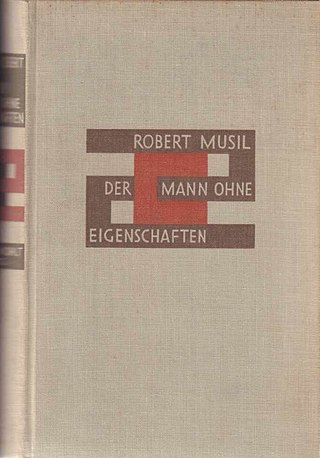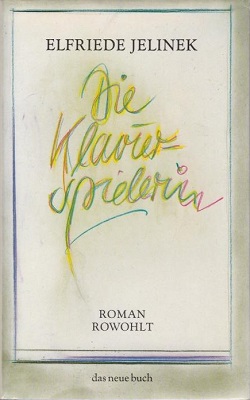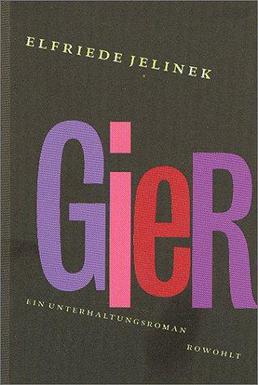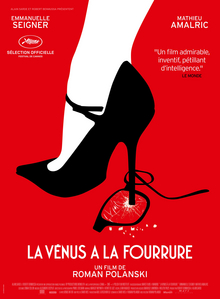Related Research Articles

Leopold Ritter von Sacher-Masoch was an Austrian nobleman, writer and journalist, who gained renown for his romantic stories of Galician life. The term masochism is derived from his name, invented by his contemporary, the Austrian psychiatrist Richard von Krafft-Ebing. Masoch did not approve of this use of his name.

Nausicaa, also spelled Nausicaä or Nausikaa, is a character in Homer's Odyssey. She is the daughter of King Alcinous and Queen Arete of Phaeacia. Her name means "burner of ships".
Rosmarie Waldrop is an American poet, novelist, translator, essayist and publisher. Born in Germany, she has lived in the United States since 1958 and has settled in Providence, Rhode Island since the late 1960s. Waldrop is a co-editor and publisher of Burning Deck Press.

Elfriede Jelinek is an Austrian playwright and novelist. She is one of the most decorated authors to write in German and was awarded the 2004 Nobel Prize in Literature for her "musical flow of voices and counter-voices in novels and plays that, with extraordinary linguistic zeal, reveal the absurdity of society's clichés and their subjugating power". She is considered to be among the most important living playwrights of the German language.

The Man Without Qualities is an unfinished modernist novel in three volumes and various drafts, by the Austrian writer Robert Musil.
Ágota Kristóf was a Hungarian writer who lived in Switzerland and wrote in French. Kristóf received the "European prize" from ADELF, the association of Francophone authors, for Le Grand Cahier. It was followed by two sequels which are collectively The Notebook Trilogy. She won the 2001 Gottfried Keller Award in Switzerland and the Austrian State Prize for European Literature in 2008.

The Piano Teacher is a novel by Austrian Nobel Prize winner Elfriede Jelinek, first published in 1983 by Rowohlt Verlag. Translated by Joachim Neugroschel, it was the first of Jelinek's novels to be translated into English.

Venus in Furs is a novella by the Austrian author Leopold von Sacher-Masoch, and the best known of his works. The novel was to be part of an epic series that Sacher-Masoch envisioned called Legacy of Cain. Venus in Furs was part of Love, the first volume of the series. It was published in 1870.
The Alexander Sacher Masoch Prize is a literary award which is conferred by the Literaturhaus, Vienna. The prize, worth 7,000 euro, is to support young Austrian writers. It was created in 1994 by the widow of the writer Alexander Sacher Masoch (1901–1972) and was initially awarded every three years.
Marlen Haushofer was an Austrian author, most famous for her novel The Wall (1963).

Greed is a 2000 novel by the Austrian writer Elfriede Jelinek. It was the first novel of hers to be translated into English after winning the Nobel Prize for Literature, and also the first book of hers to be translated into English in seven years. The English translation was published in the UK by Serpent's Tail in 2006 and in the US by Seven Stories Press in 2007. While much of her work is rooted in the Austrian literary tradition, she has also been known to take a feminist stand on the dealings of the Communist Party of Austria.

Friederike Mayröcker was an Austrian writer of poetry and prose, radio plays, children's books and dramatic texts. She experimented with language, and was regarded as an avantgarde poet, and as one of the leading authors in German. Her work, inspired by art, music, literature and everyday life, appeared as "novel and also dense text formations, often described as 'magical'." According to The New York Times, her work was "formally inventive, much of it exploiting the imaginative potential of language to capture the minutiae of daily life, the natural world, love and grief".
Lilian Faschinger is an Austrian novelist, short story writer, poet, and literary translator.

Venus in Fur is a 2013 French-language erotic drama film directed by Roman Polanski, based on the play of the same name by American playwright David Ives, which itself was inspired by Leopold von Sacher-Masoch's novel Venus in Furs. It stars Emmanuelle Seigner and Mathieu Amalric, the only actors in the film.
The Mother of God is a novel, originally the work of the Austrian author, Leopold von Sacher-Masoch (1836–1895) that was published in 1886 as "Die Gottesmutter" and then in French as La Mère de Dieu. The present English translation, released by William Holmes in January 2015, is the only known version in that language.

Marie-Thérèse Kerschbaumer is an Austrian novelist and poet, one of the leading women prose writers in German. Her mainly fictional works present the horrors of Fascism, especially the repression of minorities.

Masochism: Coldness and Cruelty is a 1967 book by the philosopher Gilles Deleuze, originally published in French as Le Froid et le Cruel, in which the author philosophically examines the work of the late 19th-century Austrian novelist Leopold von Sacher-Masoch. In the Foreword Deleuze states that Masoch has a particular way of "desexualising love while at the same time sexualizing the entire history of humanity". Deleuze attempts to "cut through" the various forms of expression and content that are the artistic creation of Leopold von Sacher-Masoch. He also attempts to develop a problematic of masochism in contradistinction to sadism, concluding that the two forms of 'pornology' are non-communicating, and cannot be integrated into Sadomasochistic entity. Deleuze argues that Masochism is something far more subtle and complex than the enjoyment of pain and that Masochism has nothing to do with Sadism.

Christine Haidegger was an Austrian poet and writer whose memoir Zum Fenster hinaus was translated into English as Mama Dear. She was influential in the Salzburg literary scene.
Wanda von Sacher-Masoch was an Austrian writer and translator, best remembered for her novel translated by Georges Ohnet from French into German titled Das Recht des Kindes (1894), and the posthumous publication The Confessions of Wanda von Sacher-Masoch (1990). She often wrote under the pseudonyms Wanda von Dunajew and D. Dolorès.
References
- 1 2 "Elfriede Czurda". 2012-03-15. Archived from the original on 2012-03-15. Retrieved 2023-09-04.
- 1 2 "Elfriede Czurda · Lyrikline.org". www.lyrikline.org. Retrieved 2023-09-04.
- ↑ "Elfriede Czurda". 2010-05-21. Archived from the original on 2010-05-21. Retrieved 2023-09-04.
- ↑ Wetzell, Richard Friedrich (2014). Crime and criminal justice in modern Germany. Studies in German History. New York: Berghahn books. pp. 239–242. ISBN 978-1-78238-246-1.
- ↑ Howes, Geoffrey C. (1999). "Therapeutic Murder in Elfriede Czurda and Lilian Faschinger". Modern Austrian Literature. 32 (2): 79–93. ISSN 0026-7503. JSTOR 24648739.
- 1 2 Czurda, Elfriede (2012). Almost 1 Book, Almost 1 Life. Burning Deck/Anyart. ISBN 978-1-936194-12-4.
- ↑ "Why This Book Should Win: "Almost 1 Book / Almost 1 Life" by Elfriede Czurda [BTBA 2013] « Three Percent" . Retrieved 2023-09-04.
- ↑ "Literaturhaus Wien: Alexander Sacher Masoch Stiftung". www.literaturhaus.at. Retrieved 2023-09-04.
- ↑ Czurda, Elfriede (2018). Diotima, Or the Difference of the Happiness Gap and Nausicaa's Lucid Dream. ISBN 978-1-57241-209-5.